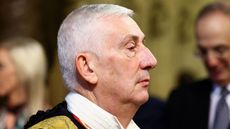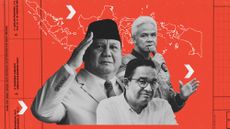Was Jimmy Carter America's best ex-president?
Carter's presidency was marred by the Iran hostage crisis, but his work in the decades after leaving office won him global acclaim

Jimmy Carter, the 39th president of the United States, has died aged 100.
A "broker of peace in the Middle East in his time, and a tireless advocate for global health and human rights", Carter was the "longest-lived president in US history", said The Guardian.
Serving only one term in the White House between 1977 and 1981 before being beaten by Ronald Reagan, his tenure as president was remembered by most Americans as "ineffective", most notably over his handling of inflation and interest rates, as well as his failure to bring home American hostages held in Iran quickly, said ABC News.
Subscribe to The Week
Escape your echo chamber. Get the facts behind the news, plus analysis from multiple perspectives.

Sign up for The Week's Free Newsletters
From our morning news briefing to a weekly Good News Newsletter, get the best of The Week delivered directly to your inbox.
From our morning news briefing to a weekly Good News Newsletter, get the best of The Week delivered directly to your inbox.
The "common view" is that Carter was a better global leader after his presidency; a judgement that is said to have "annoyed" Carter. In more recent years, however, "his allies relished him living long enough to see historians reassess his presidency".
What did the commentators say?
Taking office in 1977 as a relative unknown – and sometimes derided as "Jimmy Who?" – Carter's "unfamiliarity with Washington was seen as a virtue after the Watergate and Vietnam war years", said The Guardian.
His early years showed "promise", completing a treaty to hand over control of the Panama Canal to its host country, and bringing together the Israeli prime minister, Menachem Begin, and the Egyptian president, Anwar Sadat, "for a deal that would produce peace that endures today".
Yet hopes for his presidency were "dashed" by several economic and foreign policy crises, "starting with high unemployment and double-digit inflation and culminating in the Iran hostage crisis". A "botched" rescue attempt left eight US servicemen dead, only further feeding growing doubts about Carter's leadership. The hostages would be released in 1981, minutes after Reagan was inaugurated as the 40th president of the United States.
"What nobody anticipated at the time, however, was that Carter would go on to become, by common consent, the 'best former president America has ever had,'" said The Times. "Possessed of an almost missionary zeal", he spent the four decades after leaving office as a "sort of one-man United Nations".
After leaving office, Carter "became dedicated to promoting democracy, monitoring elections, building homes with Habitat for Humanity and eradicating disease in some of the world's poorest countries", said NPR. In 2002, he won the Nobel Peace Prize, "an honour some said he had earned a quarter century earlier when he negotiated the Camp David accords", said NPR. He ended his acceptance speech with a plea for peace: "War may sometimes be a necessary evil, but no matter how necessary, it is always evil, never a good. We will not learn how to live together in peace by killing each other's children."
"Carter showed the country that presidents' duty to serve extends well beyond their years in office," said The Atlantic. He left the Oval Office "a virtual laughing stock" but "left this earthly life a model of moral leadership".
What next?
Carter will be honoured with a state funeral in Washington on 9 January, a national day of mourning in the US. He will then be buried in his hometown of Plains, Georgia, next to his late wife, Rosalynn.
Sign up for Today's Best Articles in your inbox
A free daily email with the biggest news stories of the day – and the best features from TheWeek.com
Sorcha Bradley is a writer at The Week and a regular on “The Week Unwrapped” podcast. She worked at The Week magazine for a year and a half before taking up her current role with the digital team, where she mostly covers UK current affairs and politics. Before joining The Week, Sorcha worked at slow-news start-up Tortoise Media. She has also written for Sky News, The Sunday Times, the London Evening Standard and Grazia magazine, among other publications. She has a master’s in newspaper journalism from City, University of London, where she specialised in political journalism.
-
 Meghan Markle's Netflix show: 'bang on the money' or hopelessly 'cheugy'?
Meghan Markle's Netflix show: 'bang on the money' or hopelessly 'cheugy'?Talking Point The Duchess of Sussex relaunched her Instagram just in time for the trailer for her new lifestyle series
By Irenie Forshaw, The Week UK Published
-
 The dark side of salmon farming
The dark side of salmon farmingIn the Spotlight Scottish salmon is the UK's biggest global food export, but concern is growing over record-high death rates, escapes and environmental impact
By Harriet Marsden, The Week UK Published
-
 Ukraine and Syria: a budding new friendship
Ukraine and Syria: a budding new friendshipThe Explainer Why Zelenskyy's government is rapidly building ties with Russia's former ally in the Middle East
By Chas Newkey-Burden, The Week UK Published
-
 What will happen in 2025? Predictions and events
What will happen in 2025? Predictions and eventsThe Explainer The new year could bring further chaos in the Middle East and an intensifying AI arms race – all under the shadow of a second Donald Trump presidency
By Harriet Marsden, The Week UK Published
-
 How should the West respond to Syria's new leadership?
How should the West respond to Syria's new leadership?Today's Big Question The weight of historical interventions and non-interventions in the region hangs heavy on Western leaders' minds
By Harriet Marsden, The Week UK Published
-
 Romania's election rerun
Romania's election rerunThe Explainer Shock result of presidential election has been annulled following allegations of Russian interference
By Sorcha Bradley, The Week UK Published
-
 Political dynasties at war in the Philippines
Political dynasties at war in the PhilippinesUnder the Radar 'Fiercer, nastier, and more personal' rift between Marcos and Duterte factions risks splitting ruling coalition
By Elliott Goat, The Week UK Published
-
 Quiz of The Week: 24 February - 1 March
Quiz of The Week: 24 February - 1 MarchPuzzles and Quizzes Have you been paying attention to The Week's news?
By Sorcha Bradley, The Week UK Published
-
 Quiz of The Week: 17 - 23 February
Quiz of The Week: 17 - 23 FebruaryPuzzles and Quizzes Have you been paying attention to The Week's news?
By Sorcha Bradley, The Week UK Published
-
 Quiz of The Week: 10 - 16 February
Quiz of The Week: 10 - 16 FebruaryPuzzles and Quizzes Have you been paying attention to The Week's news?
By Sorcha Bradley, The Week UK Published
-
 Where does Indonesian democracy go from here?
Where does Indonesian democracy go from here?Today's Big Question With a controversial former general dogged by allegations of human rights abuses poised to take over the third-largest democratic country on Earth, Indonesia faces an uncertain path forward
By Rafi Schwartz, The Week US Published